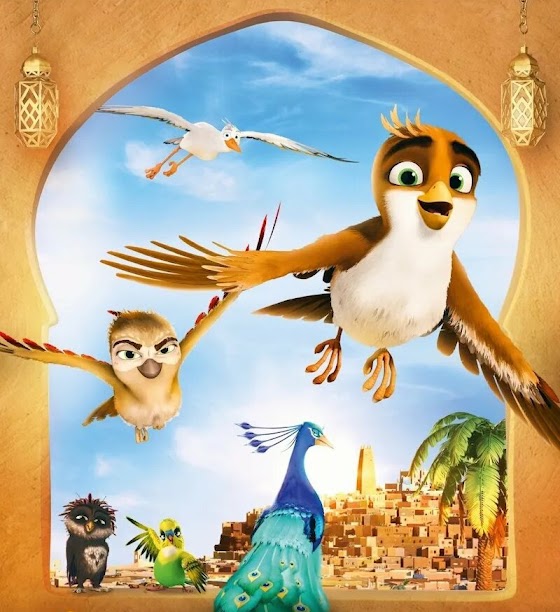That's Richard in the top right. What's that you're saying? He doesn't look
like a stork? That depends on your definition. He's a sparrow who was adopted
by a family of storks. Similarly, if a German were adopted by an English
family, would that make him English? Probably. If a cat were adopted by a dog,
would that make him a dog? Probably not. We need to make up our minds from
case to case. In this film, Richard is a stork because the title says so.
The film is a sequel to "Richard the Stork", which was released in 2017. I
didn't see the first film, but I didn't feel I was unable to understand
anything. From what I've read, the first film showed how he came to be
adopted.
The stork family lives in Africa, and they're preparing to migrate north in
the summer. I have no knowledge of storks and their migration habits, so I'll
just accept it. The storks have a contest to decide which of them is most
suitable to lead the flock northwards. Richard wins the contest as the fastest
bird, but the elders make Richard's brother Max the leader because he looks
like a stork. That's discrimination based on appearance and race. I wonder how
many children in the cinema picked up this message. Max is sympathetic and
agrees that Richard should have been chosen, but it's not his decision to
make.
Richard is in a bad mood, so he flies off by himself. He intends to return
soon, but he meets another group of birds, friends of mixed species. They're
captured by an evil peacock called Zamano, who holds one of the group hostage
until the others find a giant jewel. Richard is a natural leader and takes the
other birds on the treasure hunt.
I could say a lot more about the plot, but I'll stop there. The cinema was
almost sold out, full of young children with their parents. The film has an
age certificate of 0, i.e. children of any age can watch it, but the cinema
has a (sensible) policy that they only admit children who're at least three
years old. Looking round the room, most of the children were aged five to ten,
but there were quite a lot of very young children.
"Richard the Stork 2" (shortening the title) highlights a problem with age ratings. Germany's
categories are 0, 6, 12, 16 and 18. "Richard the Stork 2" was given the lowest
rating because there's nothing harmful for small children. But is it really
suitable for very young children? Based on the audience reaction, I'd say No.
In the opening scenes there was a lot of laughter as the storks raced. When
the treasure hunt started the laughter stopped. At times I noticed a lot of
talking in the audience. The children were getting bored. My grandson Oliver
is seven, but carefully phrased questions after the film convinced me that he
didn't understand what had happened. The dialogue was too fast and too hectic.
The plot was too complex. There was a plot twist at the end, and I groaned
inwardly. How could the children possibly understand what was happening? If it
had been up to me, I would have recommended the film for ages 12 and above.
This is an example of a badly made children's film.



No comments:
Post a Comment
Tick the box "Notify me" to receive notification of replies.